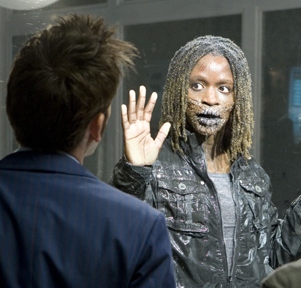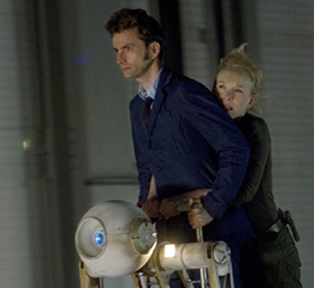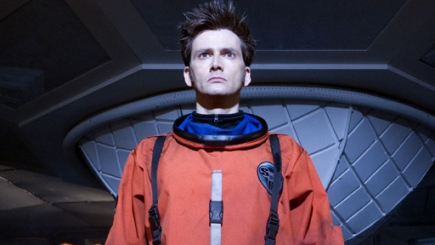Doctor Who: The Waters of Mars
After the road-traffic-accident of the Easter special, Doctor Who has precious little time to get back in gear before Russell T Davies and David Tennant’s last bows. Thankfully, The Waters of Mars gains traction almost immediately, with a compelling base-under-siege story elevated towards the extraordinary by some unprecedented character development for the Doctor. The result isn’t quite perfect, with the second quarter of the special sagging slightly, but the overall result is an extremely high-quality tale.
Almost in a bid to overwrite its past mistakes, the programme sets up a virtual retread of the under-performing episode 42. Once again, a space-age team find themselves under attack from an elemental parasite, but almost every flaw in Chris Chibnall’s story is corrected. Where the over-familiar boiler rooms which Greame Harper was forced to use in the third series once stood, the veteran director now pieces together one of the most perfectly realised environments in the show’s history. Despite being filmed in a Welsh greenhouse and quarry rather than the sands of the Middle East, Waters presents a vastly more convincing alien planet than the episode that preceded it, with some superb work by the Mill in tinting the location shots paying dividends. Where 42 gave us an uninteresting set of cardboard cut-outs, Waters gives us a perfect ensemble cast. It’s a tribute to the talent involved that Lindsay Duncan, who could easily eclipse a lesser cast, is just one of a magnificently accomplished team of actors. Each performer manages to get their character to stick in the memory, however few lines of dialogue they are granted.
 |
For all the pre-publicity claims regarding the darkness of the story, Phil Ford and Russell T Davies do a commendable job of delivering a balanced end-result, aided in no small part by Gadget. The robot is unlikely to be the subject of any calls for a comeback, but after the Doctor has used the sonic screwdriver to turn him into something from a Looney Toons short, he delivers much-needed laughs in an episode which otherwise would verge on the bleak at times. In that initial phase of the outbreak, the episode moves a little slower than expected, but the show can be forgiven for wallowing slightly in such a memorable setting. The bizarre thing is that much of Waters logically shouldn’t be unnerving. While the death-spasms of the crew uncomfortably echo the sight of Jack’s grandson being fried in Children of Earth, it’s important to remember that even the last moments of Steffi are simply an actress having some water pour on her. The horror and despair comes solely from the story, not the visuals which are provided. The return of the robot, and even the ramifications for human history, are a welcome distraction from such moments as the story moves towards its conclusion.
The extra time available for the story’s post production has had obvious benefits- Waters of Mars edges out the TV Movie for the title of the best looking instalment of the show to date. We’re in the unusual position of the little niggles present stemming from decisions by the production team, rather than budgetary or technical limitations. I’m not sure of the exact makeup of the Martian atmosphere, but given that the Doctor is forced to wear a spacesuit due to the lack of oxygen, it’s more than a little distracting to have flames dancing across the screen with gay abandon during the Doctor’s abortive exit from the base. While the intention to separate the Bowie Base from the generic grimy spaceship of 42 is laudable, the colonists all look a little too scrubbed-up given their situation. And if the Upper Boat mob thinks that you can produce such perfectly-formed carrots on your first attempt, they’ve obviously never tried growing the things themselves…
Another slight irritation was the references to the Ice Warriors. The initial hint by the Doctor as he tried to communicate with the Flood-possessed Maggie was a nice touch, but subsequent mentions of the warrior race seemed a little overblown. The old series was perfectly comfortable with visiting the red planet without mentioning its most famous residents, and it’s hard to see the value in the approach taken, unless The Moff has something up his sleeve for next year.
 |
You don’t have to be a fan to appreciate Waters of Mars, but you do have to pay attention. The episode is a bit more densely plotted than normal for a Davies script, and fully understanding the resolution to the story relied on the viewer having skim-read the Doctor’s recollections of the BBC News website at the star of the episode. The original timeline had the world knowing about the mysterious deaths of the Bowie Base crew at the hands of their captain, but in the dark as to the reasons for her actions. Adelaide’s improved version sees her still hailed as a conflicted and mysterious hero, with Mia and Yuri claiming that she saved them from certain death, but refusing to comment on how the captain returned them to Earth or the reasons for her suicide. It was in this element only that the episode suffered from standing so far outside the conventional forms of the show. Unlike Jackson Lake and Lady Christina, Captain Brooke was emphatically not a companion figure, being treated by the story as a historical figure akin to Charles Dickens or Shakespeare. It was an approach which gave the right tone to the story, but left the Doctor devoid of anyone to explain his understanding of the timeline to- a key element for this future historical event. Conveying the ripples through the time stream through the Doctor’s changing recollection of the news website gave the rather unfortunate impression that the Time Lord has broadband in his head!
It’s impossible to talk about the episode without mentioning the psychological journey which the Doctor goes through, an element which seems to have hit all the right notes with both casual and long-time viewers. The character’s outward desire to leave masks the true nature of his dilemma. Later dialogue makes it clear that he could have easily defeated the Flood if he’d acted immediately on his arrival at the Base. The only element behind his helplessness is the knowledge that he shouldn’t interfere.
One of the most fascinating elements of the show comes when its creative teams start to unpick their incarnations of the Doctor in preparation for regeneration. The late Barry Letts was on record in his view of Planet of the Spiders as a Buddhist parable, in which the third Doctor’s thirst for knowledge was revealed as a flaw that needed to be expunged. Caves of the Androzani saw the diffident fifth Doctor plunged into a world of drug-smugglers and gun-runners, in which all he can do is save his best friend. Tellingly, Davies pinpointed the problem with the ninth Doctor during the course of Parting of the Ways- for all his gruff and macho exterior, Christopher Eccleston’s Doctor was too damaged by his experiences in the time war to fulfil his responsibilities to the universe. Rose Tyler took him a very long way, but to truly restore himself, he needed to be born again. Here Davies suggests that the tenth Doctor has exactly the opposite problem.
He’s too effective.
Faced with a fully-fledged Dalek empire, at the height of its powers, and he was able to eliminate the threat almost single-handedly, an act which previously took the sacrifice of his entire race to accomplish. His solution to the Master’s takeover of Earth was to give himself almost god-like power to save the day. In Waters, Davies takes this trend to its logical conclusion, with the Doctor virtually declaring himself the King of Time. In doing do, he builds upon many elements included in the last series of the programme. Donna opened his mind to the possibility of interfering in what he’d always thought of as the inviolable, while River Song whispered to his ego of the incredible power which he’d one day wield. Crucially, though, the writer has learnt from his past mistake. Where Tooth and Claw gave us a smug and overconfident Doctor to a point that became difficult to enjoy watching him, Davies this time gives us the treat of David Tenant playing a man becoming drunk on his own legend. For a few seconds, we see a Doctor “gone wrong”- not in the style of the Valeyard, but of the Meddling Monk. There’s no self-interest in the Doctor’s actions, but he’s obviously more motivated by showing off his own brilliance than genuinely helping others.
 |
Every element of this sequence is perfectly executed. Having left himself too little time to execute his traditional lateral thinking approach to problem-solving, the Doctor is forced to deploy the narrative cheat of using the TARDIS to save the day. This plot cop-out makes the viewer subconsciously unsympathetic to the Doctor, understanding the traumatised Mia’s refusal to thank him, and prepares them for what follows. There’s a similar approach to the Doctor’s reaction to the prophecy from the previous special. In a brilliant touch the Doctor has immediately cottoned on to the meaning of the ‘four knocks’ line. While his seventh life had the self-doubt to cope with the large amounts of information which he was handed on his own future, this Doctor is assured of his own survival based on the vaguest hint of the circumstances of his end, further pushing him towards the edge. It takes Adelaide’s adoption of the responsibility he has disowned to shock the character back into sanity, but the damage is done, and he is far from comfortable with the self-understanding he’s acquired. It’s a very flayed and flaky Doctor who is left charging off into his final story. Crucially, he hasn’t given up on this life- he doesn’t just want to live, but live as THIS man. The knowledge of this incarnation’s flaw, however, is plainly going to be haunting him for the remainder of its life.
It’s easy to wish for a different set of circumstances. In a world where scheduling saw the 2009 Doctor Who specials transmitted as a weekly miniseries during December, the production team might have been comfortable leaving us with a power-mad Doctor stepping into the TARDIS before Captain Brooke could pull the trigger. In the light of the hand that was dealt, though, it’s hard to see how the cards could have been played better.
![]()
About this entry
- By Julian Hazeldine
- Posted on Monday, November 16 2009 @ 11:53 pm
- Categorised in TV, Review
- Tagged with doctor who
- 6 comments

I thought the Ice Warriors mention was pretty spiffy, and they didn’t beat us over the head with it. We had two occurrences and they worked well within the narrative of the story.
By Ben Paddon
November 17, 2009 @ 1:27 am
reply / #
Excellent review, Julian!
You raise a few points there that I’d been thinking about after the second or third viewing… when the awe effect will wear off ;)
By Marleen
November 17, 2009 @ 8:45 am
reply / #
I like the notion of this Doctor asking for a second chance.
By Dave
November 19, 2009 @ 11:16 am
reply / #
I thought the changing website pages were an objective matter, not telling us what the Doctor remembered of the situation. They were the equivalent of the erasing photographs and updating text in the Back to the Future films, which themselves are not attached to the main characters`s memories.
By aemitage
November 19, 2009 @ 8:55 pm
reply / #
> Having left himself too little time to execute his traditional lateral thinking approach to problem-solving, the Doctor is forced to deploy the narrative cheat of using the TARDIS to save the day. This plot cop-out makes the viewer subconsciously unsympathetic to the Doctor, understanding the traumatised Mia’s refusal to thank him, and prepares them for what follows.
Julian you’ve really nailed it here. RTD is such a genius with how he played the last 15 minutes. People often say ‘why can’t the Doctor just use the Tardis to escape?’ ‘Why can’t he go back 5 minutes before and stop x from happening?’ etc. We know it would feel like a cheat, a cop-out every time, a killer to the drama. So what does RTD do? he makes that part of the drama! Using the screwdriver to open Adelaide’s door (ooh er) effectively got that across too. Even though the 10th Doctor DOES use the screwdriver far too much in general, this still hit home.
By performingmonkey
November 20, 2009 @ 2:57 am
reply / #
Thank you for this.
When I watched this episode I had been coming at Doctor Who from having had a lack-luster last appearance. However, when I watched this I could only describe the experience as a series of holy-fraks and oh-noes!
By the end I was so emotionally pulled in by his dilemma and distraught by where it was going that I could do nothing but watch it all in awe. Something I haven’t done with Doctor Who in quite a while. While I am excited to see where the Christmas Episode will take us, I (like the Doctor) want for the life of not just the Doctor, but THIS Doctor.
I have loved the range that David has brought the role. From downright silly in some aspects, to caring and empathetic, all the way to downright intimidating and scary. It will be sad to see him go, but at least comforting that the show (and the Doctor himself) will be as emotionally affected by his passing as most of us will be.
By Drew Butler
November 28, 2009 @ 6:09 am
reply / #